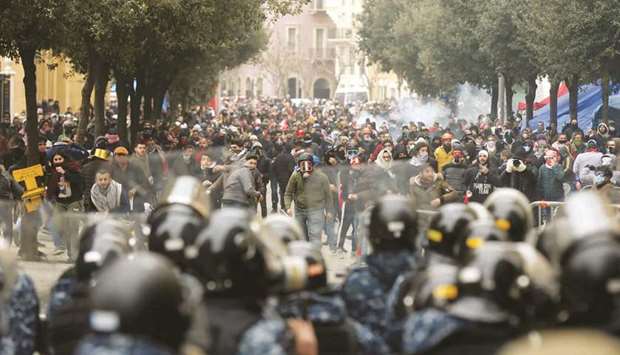Lebanon needs the help of the International Monetary Fund to draft a rescue plan and decide whether to repay its $1.2bn Eurobond maturing next month, the Annahar newspaper cited one of the country’s longest-serving politicians and a member of the ruling coalition as saying.
With the country facing its worst financial crisis in decades after months of protests, parliament speaker Nabih Berri said Lebanon should form a task force comprising the premier, ministers of economy and finance as well as legal and financial experts, the Annahar reported. The committee would begin work in parallel to making a request to the IMF.
“We need to send a message to the world, perhaps to the Americans in particular – given that they’re the most influential and active factor in the International Monetary Fund – stipulating that Lebanon needs the fund’s technical help for a rescue plan,” the newspaper cited Berri as saying.
The speaker made it clear, though, that Lebanon wouldn’t seek an IMF package as happened in Argentina in 2018 because the Lebanese public couldn’t accept the conditions that the fund would likely impose. Politicians have said that a rescue package from the lender would require Lebanon to float its pegged currency and raise taxes.
Former Prime Minister Saad Hariri – in his capacity as caretaker head of government – had asked both the World Bank and the IMF for help in drafting a plan to address the country’s economic and financial crisis. Tightening liquidity has forced the central bank and local lenders to restrict the movement of dollars, banning most transfers abroad. The measures lead to the emergence of a black market rate above the decades-old peg.
Lebanese politicians are divided over repaying about $6bn of Eurobond principal and coupon payments due this year. Some think the government should engage with bondholders to restructure its debt and save what’s left of its reserves to support imports of essential goods. Others, including Prime Minister Hassan Diab, argue that the country should pay and preserve its reputation in the international market. Lebanon has never defaulted on its debt.
The speaker’s comments were published as protesters gathered near parliament in downtown Beirut to protest over a vote of confidence in Diab’s new government. The demonstrators are demanding the complete removal of the country’s ruling elite and an end to corruption. As the session opened, Diab said his government would draft an “emergency plan” before the end of the month to address looming repayments and challenges facing the country.
At least 158 people were injured, 24 of whom needed hospital treatment, in scuffles with security forces as the army and riot police closed off all entrances leading to Parliament Square. Protesters began gathering in the capital in the early hours of the morning and local reports said some lawmakers spent the night in their offices to guarantee their arrival and secure a quorum.
Security forces used tear gas and protesters threw rocks and eggs, including at vehicles with tinted windows making their way to the square.
Hezbollah lawmaker Ali Fayyad said those trying to prevent parliament voting were risking “paralysis as we face a dangerous financial crisis.”
Diab’s government is expected to win the vote of confidence by a slim majority as many lawmakers have said they would abstain.

Demonstrators take part in a protest seeking to prevent MPs and government officials from reaching the parliament for a vote of confidence in Beirut yesterday.
